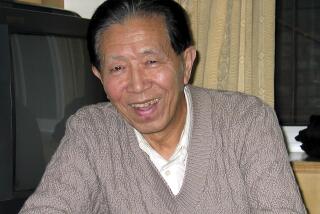Wang Ruoshui, 75; Editor Who Criticized Mao, Communism
- Share via
Wang Ruoshui, a prominent editor, Marxist philosopher and liberal intellectual who was purged from the Communist Party for his humanist writings and criticism of Chairman Mao Tse-tung, has died while visiting the U.S. He was 75.
Wang died of lung cancer Thursday at Boston’s Brigham and Women’s Hospital. He had accompanied his wife, journalist Yuan Feng, to Massachusetts, where she is a Nieman Fellow at Harvard University.
As deputy editor of the Communist Party’s flagship People’s Daily from 1977 to 1983, Wang led reformist intellectuals, supported after 1980 by party Secretary Hu Yaobang, in calling for “mental emancipation” from decades of Communist dogma.
Wang drew on the early writings of Karl Marx, as well as contemporary Eastern European thinkers, in asserting that communism, with its aim of liberation, is essentially humanist. He attributed the movement’s abuses to Leninism.
In a bold 1981 essay, Wang argued that the problem of alienation was equally possible in socialist and capitalist societies. He pointed out that the Communist Party’s evolution from the people’s servant to their overlord had alienated Chinese citizens.
“Chairman Mao was a member of the party,” he wrote. “He should have obeyed the party and obeyed the will of the people.”
But Chinese establishment intellectuals and their theories rise and fall with the fortunes of their political patrons. While elderly conservatives assailed Wang’s writings as anti-socialist, their real target was paramount leader Deng Xiaoping’s handpicked successor, Hu Yaobang.
The conservatives “not only succeeded in getting Deng to believe in the necessity of punishing Wang Ruoshui,” Wang wrote in a memoir, “but also in giving him the impression that Hu Yaobang was ‘soft and weak’” on dissent.
The conservatives’ backlash culminated in nationwide political campaigns against “spiritual pollution” and “bourgeois liberalization”--both jargon for Western intellectual trends. The first campaign cost Wang his editor’s job in 1983. The second one, in 1987, saw him kicked out of the Communist Party after 29 years of membership. That same year, Hu Yaobang was forced to resign after pro-democracy protests by college students.
A native of Hunan province, Wang began studying philosophy at Beijing University in 1946 but left two years later to join the underground Communist movement.
As an editor in the theoretical department of People’s Daily in the 1950s, he wrote criticisms of China’s chief pre-Communist liberal intellectuals.
He also participated in the denunciation of the humanism popular among “revisionists” in the Soviet Union and Eastern Europe after the death of Stalin.
During the Cultural Revolution, Wang wrote a letter to Chairman Mao criticizing the Gang of Four, headed by Mao’s wife--an act for which he was sent to labor in the countryside.
“Wang’s thinking roughly stuck to the boundaries of official discourse at the time,” said Xiao Qiang, executive director of the New York-based group Human Rights in China. “But he straightforwardly admitted that that was how he was trained and that Marxism was the most credible tool for criticizing the party from the inside.”
After his expulsion from the party, Wang’s faith in Marxism remained, but it was combined with a growing conviction about the need for human rights and democracy in China.
He joined the board of directors of Human Rights in China in 1992 despite pressure from authorities who considered the group subversive.
In 1997, finishing his memoir about the fall of Hu Yaobang, he wrote that he had abandoned his belief of a decade earlier that Communist Party rule was compatible with the task of reforming and opening China to the outside world.
More to Read
Sign up for Essential California
The most important California stories and recommendations in your inbox every morning.
You may occasionally receive promotional content from the Los Angeles Times.













